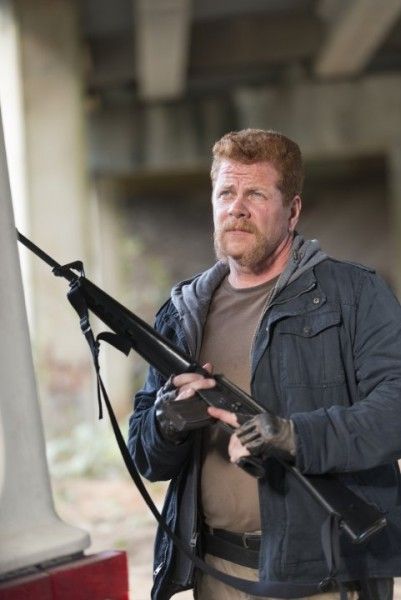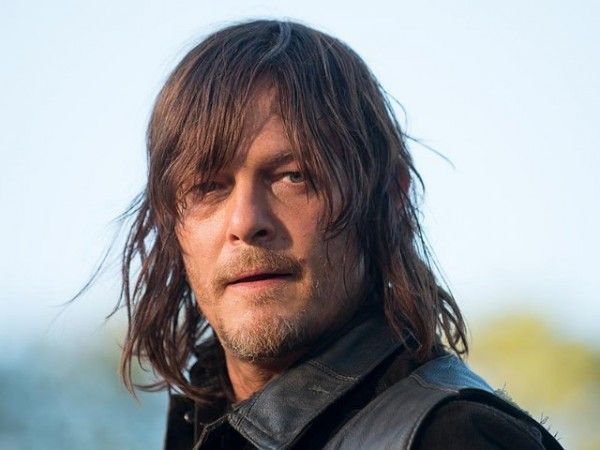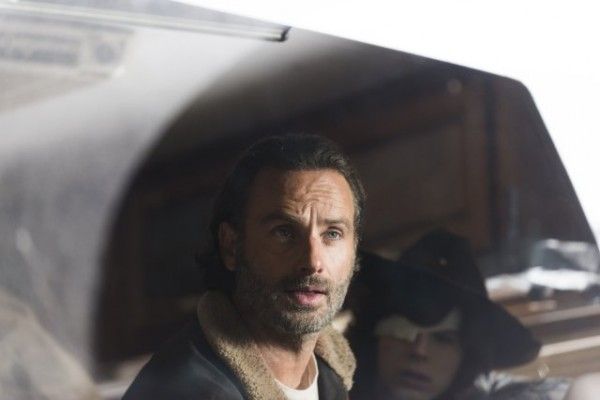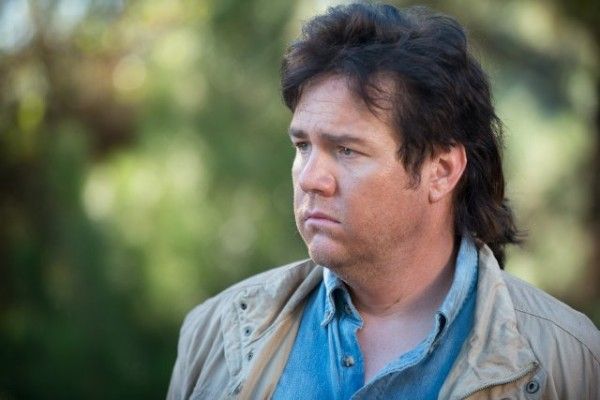One of the more popular criticisms levied against AMC's The Walking Dead is that, and I can't even believe I'm typing this, nothing happens. It's such a bland, unthinking, and patently unprovable way of looking at a series that, despite its intermittent issues, remains one of the most alluring and philosophically ruminative series on television today. In what episode does nothing happen? I've watched every episode and I can attest that things happen in every single one, even if those things are merely discussing the nature of existence with insight sans the sugar-coating, tending to the nuances of a new society, including survival, justice, and hope, and, yes, killing zombies. (Needless to say, spoilers herein!!!)
What I imagine people are talking about when they say that "nothing happens" in the series is that there's been a lack of big action set-pieces, gore, and general bad-assery, which do still occur in the series but with increasing scarcity. That's an understandable gripe, though one I would argue misses the point of the series and its evolution in tone since the second season of the Robert Kirkman adaptation. To me, the series is now more of a Western than anything else, as the world that Rick (Andrew Lincoln) and his crew live in now is quite similar to the worlds that filmmaker John Ford investigated in the 1940s and 50s. The sense of mythology given to the characters, the rendering of a society where trade and labor are just as important as money, the popularization of violence and crime as kinds of social necessities, and the focus on universal themes - faith, murder, work, friendship, love, violence, etc. - rather than modernity all make the series recall a time similar to when uttering the name Billy the Kid or Wyatt Earp could stun an entire saloon.
From the middle of season 6 on, the name Negan has had a similar kind of power, as if the specter of death followed the name and sucked the life out of anyone who heard or spoke the name. And to the credit of the show's creators and writers, his name comes up sparingly in season 6, enough to build up the sense of dread that the character, played by a particularly lively Jeffrey Dean Morgan, carries with him but not so much that literally nothing else seemed to matter. So when he arrived at the end of last night's season finale, properly entitled "Last Day on Earth," his opening monologue landed with a measured yet forceful grandiosity, with Morgan clearly enjoying the theatrical menace that denoted the character in Kirkman's comics.
The character's arrival and his speech, however, is not what people have been barking about his morning, but rather the decision to not show who of Rick's group was the victim who tasted the business-end of Lucille, Negan's barb-wire-wrapped baseball bat. To review, at the end of the episode, the camera takes the perspective of the speechless victim and is whacked once or twice before the screen goes to black, with several more increasingly wet-sounding thwacks being heard after that. It's a clever trick that, for me, paid off, with the sound of Lucille sinking deeper into some poor soul's skull perfectly underlining the thorough brutality of Negan's act.
This decision keeps the scene focused on Negan primarily, which was the point of the sequence at the end of the day. If the episode had ended with the death of some beloved character having their head turned into a substance not unlike beef stroganoff, the scene would be about them and their demise, how Negan affects Rick's group, rather than about Negan as a character. And whatever else you might say about The Walking Dead, it's obsessively interested in the details of characters, from personal ideologies to familial histories. David Morrissey's The Governor was not simply a sadistic villain who grasped control of a community, but rather an incrementally discovered personality that crafted actions and speeches to perfectly manipulate his audiences to devotion. In Negan's first sequence, one can similarly see how he takes ahold of a crowd, how his power comes from his ability as a public performer.
From the talk on Facebook and Twitter today, it seems that people felt cheated, as if the entire season was building up to that moment and the fact that we didn't get our cadaver was some sort of cheat. How so? The show has not, in any way, teased the fact that Negan was going to kill off a major character at the end of this season. There have been moments, such as when Glenn (Steven Yeun) sees the polaroids of the busted-in faces on the wall of the Saviors' barracks or when the Hilltop community talks about the 16-year-old who was killed when Negan arrived, that suggested that Morgan's character would do something extravagantly violent when he met Rick but nothing specific was teased in terms of who would die or how outside of the comics.
The only reason anyone was expecting a very clear big kill was because that's what happens in the comics, and there was some (incredibly misplaced) expectation that the scene would go down exactly like it did in the source material, with a possible change of victim. This is a series that has famously played fast and loose in adapting its source material, and its revelations have similarly been elongated in several instances, often to an annoying degree. The scenes that went into suggesting that Glenn died earlier this season, for example, smacked of desperation and blatant trickery that did not fit into the series' sense of storytelling. The fact that we don't see who had the close and personal meeting with Lucille does not seem like a trick meant to make us question what has happened in the narrative but simply asks us to wait to find out which major character is dead.
There is, inarguably, an element of stringing along going on here but this show has always enjoyed and savored its cliffhangers. For example, the last major break left us wondering how Rick, Carl (Chandler Riggs), and other members of Alexandria would get out of a zombie-infested community. If one were to take away the final sequence - if the episode ended with Eugene (Josh McDermitt) getting into the RV, for instance - the episode would have been as strong as any other episode, highlighting that much like Morgan (Lennie James) can no long evade murder, Rick can no longer evade facing Negan and the Saviors, and the war that comes with them.
If the comics are any barometer of what will be seen, the beating that Negan gives to one of Rick's closest friends will be agonizing to watch, and the show has had more than a few instances of clearly savoring the suffering and death of a character before; the demise that always comes to mind for me is Noah, played by Tyler James Williams, which I found borderline distasteful. If that's what we're in for, I'm more than happy to put the festivities off but I would suggest that this show doesn't need to hold on this moment of gore as much as we didn't need to take our time to almost luxuriate in Noah's horrible end. The Walking Dead has gone beyond the simple thrills of blood and guts, and when the writers, directors, and creators decide to indulge in, they forsake not only the progressive merits of their superb series but the evolution of the horror genre on the whole.






